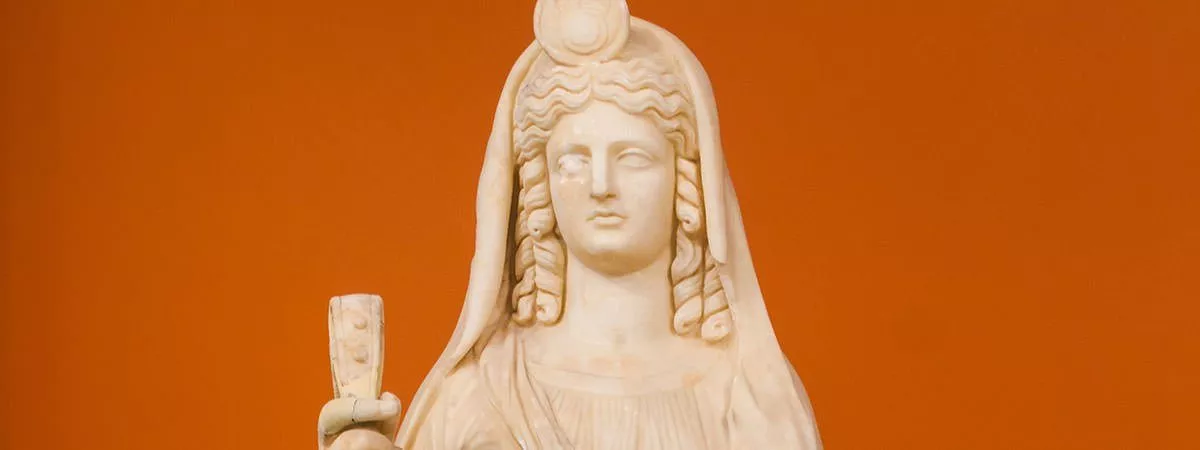In Greek mythology, Persephone is the Queen of the Underworld owing to her famous abduction and marriage to Hades, God of the Underworld. Persephone is the daughter of the Zeus (chief Olympian God) and Demeter (Goddess of agriculture), and is associated with the spring season, fertility and vegetation. She, along with with her mother Demeter, were the central figures of the Eleusinian mysteries, the most famous secret religious rites of ancient Greece. Persephone is popularly depicted as a completely robed woman carrying a scepter and a sheaf of wheat, depicting her association with vegetation. However, when depicted along with her mother, Demeter typically carries the sceptre and the sheaf, while Persephone is shown holding a special type of a four-tipped torch which was used in the Eleusinian mysteries. Her abduction by Hades is a popular theme in Greek art and literature, personifying the seasons of the year and their impact on the growth of vegetation. Persephone is known by several names like Kora (the maiden), Persephassa (girl, maiden), Despoina (the mistress) and Persephatta (female thresher of grain). In the Latin language she is called as Proserpina while the Romans later appropriated her as their Goddess Libera. Know more about the Queen of the Underworld with the 10 most famous myths featuring Persephone.
#1 Abduction of Persephone
Persephone was the only daughter of the Goddess Demeter from the chief Olympian God Zeus. Persephone grew up to be a beautiful young girl attracting the attention of several Olympian Gods including Apollo, Ares, Hephaestus and Hermes. However, Persephone rejected the advances of all her suitors and instead spent much of her time interacting with and tending to nature. Hades was Persephone’s uncle and the brother of Demeter, who had been given dominion over the Underworld after the Olympians overthrew the Titans. In certain myths, Hades was looking for a worthy consort and complained to Zeus regarding the same, and the later suggested Persephone as an ideal candidate. Other myths simply point to Hades setting his eyes upon the Goddess. All the same, Hades decided on abducting Persephone for himself. One day, as Persephone was gathering flowers in the Nysian meadow along with her attending nymphs, she wandered apart from the group attracted by a glorious fragrant flower in full bloom. As the Goddess reached to pluck it, the ground below her feet opened up and Hades appeared before her on his golden chariot. He consequently kidnapped her and took her to his realm of the Underworld, to be his queen and wife.
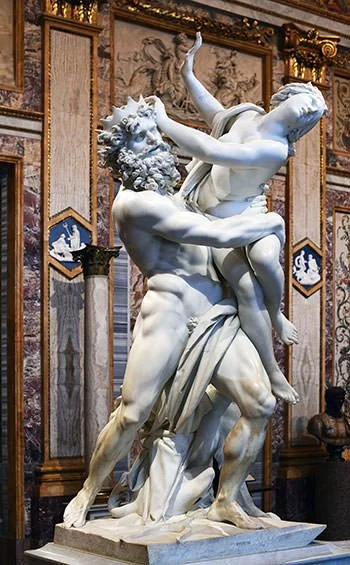
#2 Demeter’s Search For Persephone
The disappearance of her daughter caused great grief to the Goddess Demeter, who set out in search for her. Persephone’s attending nymphs were transformed into sirens for their failure to protect the Goddess. They were also given wings and tasked with finding Persephone. Demeter herself wandered throughout the earth accompanied by Hecate (Goddess of night and magic), who guided her through the night with her flaming torches. Finally it was the Helios (God of the Sun), who observes everything on the surface of the earth, who told Demeter of what had transpired between Hades and Persephone. Knowing that she wielded little power in the Underworld, Demeter became distraught and began to wander aimlessly, ignoring her duties to the world. As she was the Goddess of fertility and agriculture, the earth suffered and became barren, causing great famines which consequently brought about death and destruction. Looking at the grim situation that prevailed Zeus had no option but to intervene in the matter. He thus asked his herald Hermes to travel to the Underworld and command Hades to return Persephone to her mother.
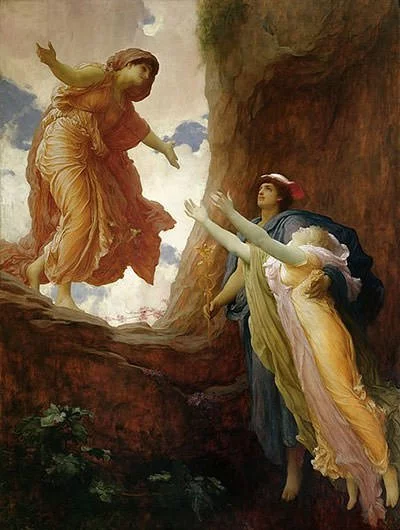
#3 Deception of Hades
The king of the Underworld, Hades was wise enough not to completely discard Zeus’s wish. Instead he played a trick of his own convincing his reluctant bride Persephone to eat a few seeds of the pomegranate fruit, before letting her go. This consumption of food in the Underworld acted as a binding contract to that realm and Hades knew that Persephone could never be completely free. It was thus finally agreed on that Persephone would spend eight months of the year with her mother on Olympus and the remaining four months with Hades as the queen of the Underworld. The myth personified and explained the seasons of the year and the fertility of the land. The period that Persephone spent in the Underworld coincided with Demeter’s grief and the dark, winter months. The time when Persephone goes back to her mother coincided with Spring and the elated Demeter gave abundance of produce to the land.
#4 Persephone And Adonis
The myth of Adonis mirrored Persephone’s own story in some ways. Adonis was a mortal who was born from a tree when his cursed mother was transformed into a myrrh bush by Zeus. The newly born Adonis was discovered by Aphrodite who was taken in by his beauty. She hid the child and avoiding any attention took him to the Underworld where she handed him to Persephone. Adonis grew into one of the most handsome mortals in Greek Mythology and both the Goddesses fell in love with him. When Aphrodite finally came to take him back, Persephone refused to let him go. Zeus was thus called to resolve the dispute between the Goddesses. The king of the Olympians decided that Adonis would be with Persephone for a third of the year and with Aphrodite for the same period. For the remaining third of the year, Adonis could decide who he stayed with. However, Adonis would soon die in a hunting accident.
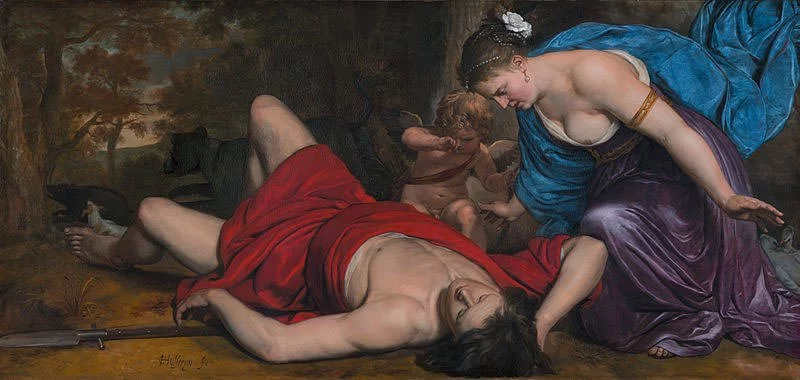
#5 Persephone And Minthe
Greek myths identify Minthe as an incredibly beautiful Naiad nymph who presided over the river Cocytus, among the 5 rivers that flowed through the Underworld (realm of Hades). According to one story Minthe and Hades were having an affair before the abduction of Persephone. After Persephone became the queen of the Underworld, the rejected Minthe in her jealousy proclaimed herself to be more noble and beautiful than Persephone. She further boasted that Hades would soon grow tired of Persephone and would return once again to her. The rash words angered Persephone who trampled on Minthe and transformed the later into the mint plant. In another variation of the story it was Demeter who transformed Minthe by trampling her. In another alternate version of the story a jealous Persephone transforms Minthe into the mint plant when she catches her trying to seduce her husband Hades.
#6 Trickery of Sisyphus
Counted among the craftiest and most deceitful of men in Greek myths, Sisyphus was the founder and first king of Ephyra (estimated as Corinth). According to a story when Sisyphus was about to die he asked his wife Merope not to perform the usual rituals after his death, and to throw his naked body in the middle of the public square. Finally when his soul reached the shores of the River Styx in the Underworld, Sisyphus complained to Persephone. He requested the Goddess permission to be taken back to the living world, so that he may punish his wife for her omission. Persephone fell for the trick and Sisyphus returned home to live to a ripe old age before dying again. Sisyphus was ultimately punished by Hades for cheating death and asked to endlessly roll a huge boulder up a steep hill.

#7 Orpheus And Eurydice
In Greek mythology, Orpheus was a legendary poet, musician and prophet, who had the ability to charm all things living and even the stones with his music. Orpheus was madly in love with his wife Eurydice and one particular day when she suddenly passed away from a snake bite, Orpheus was engulfed in grief. Orpheus then decided to do what no mortal had dreamed, to visit the Underworld and fetch his beloved wife from the land of the dead. Aided by his soulful music, Orpheus made his journey to the Underworld where Persephone and Hades were astonished to see a living being approach their throne. Upon hearing his story of love the king and the queen bowed to him. Persephone remembered how her mother had searched for her all through the world, and she remembered the touch of her mother’s tears upon her face. And Hades remembered how his love for Persephone had led him to abduct her. Moved my Orpheus’s love for Eurydice, they granted him a privilege that no mortal had ever gained, allowing the couple to make the journey back into the land of the living. There was only one condition, that on their way up neither Orpheus nor Eurydike should look back. Alas, Orpheus looked back and Eurydice was pulled back into the Underworld.
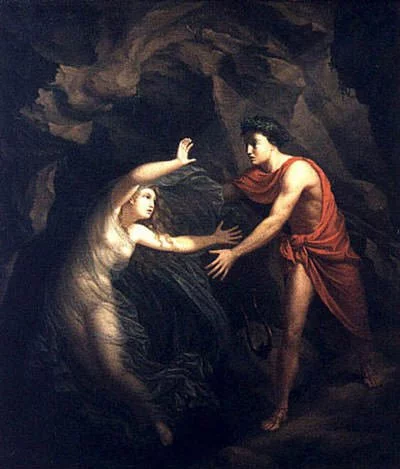
#8 Orphic Legend of Zeus And Persephone
According to Orphic legends (based on the stories of Orpheus), Zeus and Persephone bore a child together who went on to become the Olympian God Dionysus. In what was not uncommon among the Greek Gods, Persephone was simultaneously Zeus’s daughter, niece and sister-in-law. According to the myth, Zeus seduced Persephone in a cave in the form of a serpent and the union resulted in the birth of Dionysus. The child was a favourite of his father who despite his infancy was able to climb onto the throne of Zeus and brandish his lightning bolts, making him in many ways the successor of Zeus. This was not acceptable to the Goddess Hera (Zeus’s wife), who in her jealousy incited the Titans to kill the child. With her assistance the Titans finally managed to accomplish the task and the infant Dionysus was torn apart and eaten. However, Athena (Goddess of wisdom and warfare) managed to save the child’s heart and gave it to Zeus. An enraged Zeus struck the Titans with lightning, and they were consumed by fire. He then put the surviving heart into a potion and gave it to one of his mortal lovers, Semele. Finally Dionysus was born from Semele as the reincarnation of the son Persephone had born.
#9 Persephone And Pirithous
Among one of the famous tales regarding Persephone, the Greek hero Pirithous once ventured into the Underworld seeking to marry her. In Greek mythology, Pirithous was the king of the Lapiths in Thessaly and the son of the Goddess Dia from either Ixiom or Zeus. Pirithous met up with the famous Greek Hero Theseus and the two became the best of friends. After the death of their wives, Theseus and Pirithous pledged to marry Zeus’s daughters. Theseus chose Helen of Sparta and the heroes together kidnapped her when she was 13 years of age. Theseus then decided to wait until she was old enough to marry and kept her with his mother Aethra, at Aphidnae. Pirithous on the other hand decided on a more esteemed and dangerous prize, Persephone. The two friends thus travelled to the Underworld where they had an encounter with none other than Hades. The king of the Underworld pretended to offer them hospitality and set a feast for them, but as soon as the pair sat down, they were magically bound to their seats. Finally it was the hero Heracles (Hercules) who freed Theseus on his visit the Underworld. However his attempt to liberate Pirithous failed. He was thus cursed to remain in the Underworld for eternity. It is implied that Pirithous had committed too great a crime by desiring Persephone, queen of the Underworld and wife of one of the great Gods.
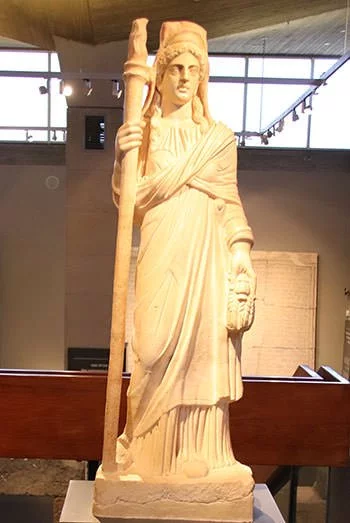
#10 Final Labor of Psyche
The myth from the 2nd century Latin author Apuleius narrates the story of Psyche, a mortal princess from Greece. Psyche was so beautiful that the people compared her beauty to that of Aphrodite, the Greek Goddess of love and beauty. This invited the wrath of the Goddess who started making life difficult for Psyche. As her tumultuous life unfolded Psyche found herself married to Eros (God of love), separated from her husband and then as slave to Aphrodite performing the labors of the Goddess. The final labor assigned to Psyche was to bring back some of Persephone’s beauty from the Underworld. As no living soul could enter the Underworld, Psyche decided to take her own life. However, she was saved in time by certain mysterious whispering voices that guided her in her quest and led her to the Underworld. Psyche finally found audience with Persephone, who appeared sympathetic and kind, but Psyche refused the Goddess’ hospitality having been warned against consuming anything or taking a seat in the Underworld. Finally, Persephone agreed to help and gave Psyche a golden box that contained some of her beauty. As Psyche was returning she could not let go of her curiosity and decided on having some of Persephone’s beauty for herself. However on opening the box Psyche was engulfed in deep sleep, for it did not contain Persephone’s beauty but instead the recipe of everlasting slumber. Later in the story Psyche was restored by Eros and transformed into a Goddess by Zeus.

